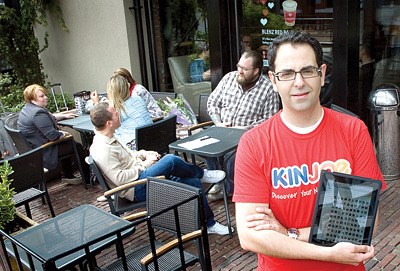When an Angus Reid poll released in November showed Vancouverites are among the most social media addicted and socially isolated people in the country, Emir Aboulhson wasnt surprised at all.
For nearly a year, Aboulhson had been taking note of the apparent correlation between Vancouvers icy social reputation and its love affair with online socializing. His solution? Kinjoe.com, a made-in-Â鶹´«Ã½Ó³»social networking site expressly designed to combat the social isolation that some experts suggest accompanies social media use.
In the already crowded social media field, Aboulhson believes Kinjoe will stand out by filling an untapped niche: connecting people with their geographic neighbours so they can socialize with real people in the real world.
People are being connected around the world but borrowing a hammer is incredibly difficult, Aboulhson says in a phone interview from his Yaletown office.
Rather than follow Facebooks model of connecting people who already know one another, Kinjoe, which opened for beta testing across B.C. last week, aims to put names and faces to the anonymous inhabitants of your immediate neighbourhood. Users are invited to discover people with similar interests who live within a 20-minute walk.
The site actually functions more like a dating site for friends than a social network, says Aboulhson.
It really can break down the meet-up into one-one-one... youre not dealing with a social interest or group interest, youre dealing with an individual thats trying to find like-minded individuals.
Kinjoe allows users to post or comment on common interests, organize meet-ups and poll area residents on issues and ideas. Theres even an option to find out who lives in your apartment building, but Aboulhson says the verdict is still out on whether that feature is cool or creepy.
Were on the fence on that one, he says, noting the site will change and adapt to user preferences as it hopefully gains traction. Were really at the mercy of our users right now because you design the concept, you do all the testing but once you put it onto a city you dont know what people are going to do with it specifically.
An initial test run in Yaletown one of Vancouvers more socially distant neighbourhoods, according to Aboulhson yielded 500 users and several successful real-life connections in the form of bocce ball games, reading groups and running clubs, he adds.
Sites like Kinjoe could combat increasing incidence of social isolation in recent years says UBC sociology professor Christopher Schneider.
One of the things thats changed with urbanization and moving online into cyberspace and becoming basically a large group of strangers is that this idea of trust becomes compromised, he says, noting many people in dense urban centres automatically regard neighbours with suspicion, preventing them from reaching out socially.
A skewed perception that violent crime is more prevalent than it is combined with an instinct to protect personal privacy in close quarters contributes to an overly acute sense of stranger danger, says Schneider. The ability to vet neighbours online may make it easier for some people to make social connections in their immediate community.
This web page, whether or not it is successful, can maybe bring back understanding of trust and kind of highlight the importance of trust in our everyday lives as human beings, as social beings, he says.
Jason Mogus, CEO of digital strategies company Communocopia, also sees potential in Kinjoe. For a social network to be successful it has to satisfy a real need, says Mogus, and the site does appear to lessen the hurdles to making friends for newcomers, or even just people who consider themselves shy or socially awkward.
However the site will need a critical mass of early adopters if it is to eke out a space in the social networking landscape, says Mogus. That could prove difficult, since signing up requires users concede a certain level of vulnerability.
It takes some risk to kind of dangle yourself out there and say Im lonely, or Im looking to connect with people in a non-sexual way, says Mogus. Although, he adds, there is potential for this kind of socializing to become normalized over time, just as occurred with online dating. Either way, Mogus says from a professional standpoint Kinjoe piques his interest.
I hadnt heard an idea this different, especially coming out of this town, in a long time, he says.
Kinjoe may have captured the attention of social media experts, but one early user is less impressed.
Linzi Mc Glennon relied almost exclusively on Twitter, Yelp and Facebook to forge a real-life social network when she arrived in Â鶹´«Ã½Ó³»earlier this year. The Yaletown resident and transplant from London, England, was one of the first to sign up for Kinjoe, but found the sites proximity angle a bit much.
Im not sure I want to connect with people in my neighbourhood, I know that sounds strange, she says. However Mc Glennon admitted that if it came down to it, shed much rather meet her neighbours online than introduce herself in the elevator. Id be more inclined to do it through social [media]. Id never speak to somebody really in the lift. No, never.
And thats precisely the attitude Aboulhson is counting on to make Kinjoe fly if only for those who are looking for an icebreaker to meet their neighbours.
Theres something about seeing the same people on a daily basis elevator socializing... Imagine one day you see someone posting something, the next time you see that person youre probably going to bring that conversation up.



